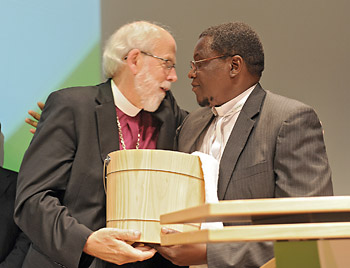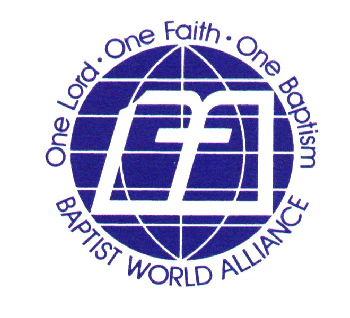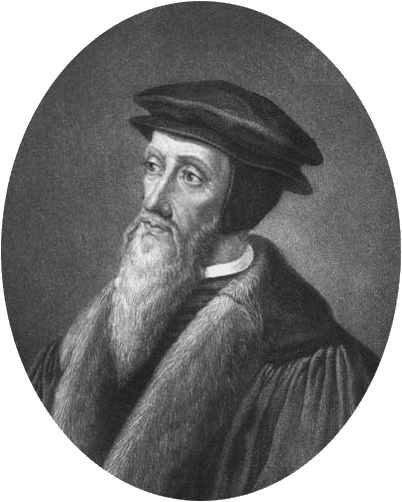Difference between revisions of "Ecumenical Dialogue"
| Line 128: | Line 128: | ||
|- | |- | ||
| Enns, Fernando. ''Friedenskirche in der ökumene: Mennonitische Wurzeln einer Ethik der Gewaltfreiheit'' (Göttingern: Vandenhoeck & Ruprecht, 2003). || This is by far the most sophisticated and informed survey of Mennonite ecumenical conversations – both historically and theologically. | | Enns, Fernando. ''Friedenskirche in der ökumene: Mennonitische Wurzeln einer Ethik der Gewaltfreiheit'' (Göttingern: Vandenhoeck & Ruprecht, 2003). || This is by far the most sophisticated and informed survey of Mennonite ecumenical conversations – both historically and theologically. | ||
| + | |- | ||
| + | | Enns, Fernando. ''The Peace Church and the Ecumenical Community: Ecclesiology and the Ethics of Nonviolence.'' Translated by Helmut Harder. Kitchener, Ont.: Pandora Press, 2007. || English translation of the German text cited above. | ||
| + | |- | ||
| + | | Erb, Paul. ''Orie O. Miller: The Story of a Man and an Era.'' Scottdale, Pa.: Herald Press, 1969. || Erb credits Orie Miller with initiating the first serious Mennonite ecumenical involvement in the modern era through his efforts to strengthen Mennonite peace theology and share it with other Christians. | ||
|- | |- | ||
| Fast, Heinold. “A Mennonite View on the Reformed Condemnations,” in Hans Georg von Berg, et al., eds. Mennonites and Reformed in Dialogue (Geneva, 1986), 57-60. || | | Fast, Heinold. “A Mennonite View on the Reformed Condemnations,” in Hans Georg von Berg, et al., eds. Mennonites and Reformed in Dialogue (Geneva, 1986), 57-60. || | ||
| Line 198: | Line 202: | ||
|- | |- | ||
| Hostetler, Beulah S. “Nonresistance and Social Responsibility: Mennonites and Mainline Peace Emphases, ca. 1950-1985,” ''MQR'' 64 (Jan 1990), 49-73. || | | Hostetler, Beulah S. “Nonresistance and Social Responsibility: Mennonites and Mainline Peace Emphases, ca. 1950-1985,” ''MQR'' 64 (Jan 1990), 49-73. || | ||
| + | |- | ||
| + | | Hostetler, Beulah Stauffer, “Franconia Mennonite Conference and American Protestant Movements, 1840-1940” (Ph.D. Dissertation, University of Pensylvania, 1977). || | ||
|- | |- | ||
| Kauffman, Ivan J. “Mennonite-Catholic Conversations in North America: History, Convergences, Opportunities,” ''MQR'' 74 (Jan 1999), 35-60. || | | Kauffman, Ivan J. “Mennonite-Catholic Conversations in North America: History, Convergences, Opportunities,” ''MQR'' 74 (Jan 1999), 35-60. || | ||
| Line 234: | Line 240: | ||
|- | |- | ||
| Roth, John D. “A Historical and Theological Context for Mennonite-Lutheran Dialogue,” ''MQR'' 76 (July 2002), 263-276. || | | Roth, John D. “A Historical and Theological Context for Mennonite-Lutheran Dialogue,” ''MQR'' 76 (July 2002), 263-276. || | ||
| + | |- | ||
| + | | Roth, Willard and Gerald W. Schlabach, eds. ''Called Together to be Peacemakers: Report on the International Dialogue between the Catholic Church and the Mennonite World Conference, 1998-2003.'' Kitchener, Ont.: Pandora Press, 2005. || Abridged Edition with discussion questions. The Report was also published in ''Information Service'' [of The Pontifical Council for Promoting Christian Unity], No. 113 (2003: II/III): 111-148. The [http://www.oecumene.nl/files/Documenten/Called_%20together_to_be_Paecemakers.pdf full-text is also available online]. | ||
|- | |- | ||
| Saxer, Ernst, et al. “The Attitude of the Reformed Churches Today to the Condemnations of the Baptists in the Reformed Confessional Documents,” in Hans Georg von Berg, et al., eds. ''Mennonites and Reformed in Dialogue'' (Geneva, 1986), 42-56. || Second Helvetic Confession [1561/62 – Bullinger; brings to a close long sequence of Reformed confessions in the 16th century; made official in 1566; clear division with Catholics and Anabaptists] “condemns” Anabaptists twice (chs. 20 and 30). One thing clear: “to the extent that these repudiations were used to justify the oppression and persecution of the Anabaptists, the Reformed churches must disassociate themselves from them. Repudiation of teachings should not in any case have been permitted to end in public prosecutions, executions and banishments. The Reformed churches have no right to ignore the wrongs done to the Anabaptists in the course of the centuries or even to use any argument whatever to excuse these wrongs” (42). | | Saxer, Ernst, et al. “The Attitude of the Reformed Churches Today to the Condemnations of the Baptists in the Reformed Confessional Documents,” in Hans Georg von Berg, et al., eds. ''Mennonites and Reformed in Dialogue'' (Geneva, 1986), 42-56. || Second Helvetic Confession [1561/62 – Bullinger; brings to a close long sequence of Reformed confessions in the 16th century; made official in 1566; clear division with Catholics and Anabaptists] “condemns” Anabaptists twice (chs. 20 and 30). One thing clear: “to the extent that these repudiations were used to justify the oppression and persecution of the Anabaptists, the Reformed churches must disassociate themselves from them. Repudiation of teachings should not in any case have been permitted to end in public prosecutions, executions and banishments. The Reformed churches have no right to ignore the wrongs done to the Anabaptists in the course of the centuries or even to use any argument whatever to excuse these wrongs” (42). | ||
| Line 242: | Line 250: | ||
|- | |- | ||
| Smucker, Donovan. “Ecumenism,” ''ME'' 5:257-258. || | | Smucker, Donovan. “Ecumenism,” ''ME'' 5:257-258. || | ||
| + | |- | ||
| + | | Paul Toews, “The Long Weekend or the Short Week: Mennonite Peace Theology, 1925-1944." ''MQR'' 60, no. 1 (January, 1986), 38-57. || Toews chronicles the development of Mennonite peace theology in the period between the World Wars, with particular attention to the ecumenical activities (and their critics within the Mennonite Church) that contributed to this movement. | ||
|- | |- | ||
| Truemper, David G. “The Role and Authority of Lutheran Confessional Writings: Do Lutherans Really “Condemn the Anabaptists?” ''MQR'' 76 (July 2002), 299-313. || | | Truemper, David G. “The Role and Authority of Lutheran Confessional Writings: Do Lutherans Really “Condemn the Anabaptists?” ''MQR'' 76 (July 2002), 299-313. || | ||
| Line 350: | Line 360: | ||
|- | |- | ||
| Zigler, M.R. ''The Christian and War: A Theological Discussion of Justice, Peace and Love''. Amsterdam: Historical Peace Churches and Fellowship of Reconciliation, 1958. || A joint letter submitted from the Historic Peace Church service agencies to the World Council of Churches, arguing that war is contrary to God’s will, and suggesting that such an affirmation ought to be a foundation of ecumenical discussion, fellowship, and union. The letter is published together with a response from the WCC by Reinhold Niebuhr and Angus Dun, and a further statement by the peace churches. | | Zigler, M.R. ''The Christian and War: A Theological Discussion of Justice, Peace and Love''. Amsterdam: Historical Peace Churches and Fellowship of Reconciliation, 1958. || A joint letter submitted from the Historic Peace Church service agencies to the World Council of Churches, arguing that war is contrary to God’s will, and suggesting that such an affirmation ought to be a foundation of ecumenical discussion, fellowship, and union. The letter is published together with a response from the WCC by Reinhold Niebuhr and Angus Dun, and a further statement by the peace churches. | ||
| − | |||
| − | |||
| − | |||
| − | |||
| − | |||
| − | |||
| − | |||
| − | |||
| − | |||
| − | |||
|- | |- | ||
| Insert bibliographic citation here. || Online: | | Insert bibliographic citation here. || Online: | ||
Revision as of 22:18, 5 November 2012

Ecumenical Dialogue Between Mennonites and Other Christian Faith Traditions
This site, currently under construction, offers a window into the relatively recent involvement of Mennonite (and Anabaptist-related groups) in ecumenical involvements of various sorts. Some expressions of Mennonite ecumenicity have emerged in response to formal invitations from other Christian groups seeking a "healing of memory" in light of the conflict that surrounded our origins in the 16th century. Other ecumenical engagements have been more informal--lay initiatives seeking deeper understanding and reconciliation at a local level. This site provides access to bibliographic information on Anabaptist-Mennonite ecumenical involvements, texts of working papers and formal statements, an overview of the emerging reception history and links to other resources. Please add additional relevant information based on your own interest and expertise!  Mennonite World Conference President Danisa Ndlovu of Zimbabwe presents Lutheran World Fellowship President Bishop Mark S. Hanson with a wooden foot-washing tub to represent Mennonites' commitment to a future “when the distinguishing mark of Lutheran and Anabaptist-Mennonite relationships is boundless love and unfailing service” in Stuttgart, Germany.[1] Interchurch and Interfaith DialogueOver the years, Mennonite Church USA, Mennonite Church Canada and other Mennonite organizations like Mennonite World Conference have engaged in conversation between other Christian churches and denominations.
LutheransStuttgart 2010 (Documents, News Releases, International Reception)"STUTTGART, Germany (RNS/ENInews) A global Lutheran assembly in Germany has asked for forgiveness for the 16th-century persecution of Anabaptists, the religious reformers whose modern-day descendants include Mennonites. “We remember how Anabaptist Christians knew suffering and persecution, and we remember how some of our most honored Reformation leaders defended this persecution in the name of faithfulness,” said Bishop Mark Hanson, president of the Lutheran World Federation, at a joint service of repentance with Mennonites on July 22." Excerpt taken from The Christian Index, accessed here. ELCA-MCUSA Conversations, 2002-2004 (Documents, News Releases, Reception)Representatives of the Mennonite Church USA (MCUSA) and the Evangelical Lutheran Church in America (ELCA) met in Goshen, Indiana February 21-24, 2002, beginning the first in a series of dialogues between the two denominations. Included in this round of conversation were reflections upon the Protestant Reformation, the experience of each church in the North American context, and the role and authority of confessional writings. A key element in the dialogue was an examination of the persecution of Anabaptists by Lutherans and others, and the healing of those painful memories. In the course of this first round, the dialogue explored each church’s hermeneutic for interpreting Scripture, the role and authority of Church structures, and the relationship between Church and state. From February of 2002 until March of 2004, topics included baptism, the Lord’s Supper, nonresistance and non-violence, pacifism and the Gospel of peace, anthropology and free will, and others. Throughout the dialogue, members of congregations were given opportunities to meet with and discuss these issues as the group sought to deepen levels of trust and cooperation between our two church bodies. Their continued hope is that our deepening fellowship will strengthen both faith communities for mission in the world.[3] BaptistsSeventh-Day AdventistsRoman Catholic Church"A dialogue between Catholics and Mennonites took place over a five-year period, from 1998-2003. The general purpose of the dialogue was to get better acquainted, to better understand Catholic and Mennonite positions on Christian faith and to contribute to overcoming long-held prejudices. Under discussion were the intersection of the history of the two denominations; theology around the nature of the church, sacraments and ordinances and the commitment to peace; and addressing the healing of memories."[4] Reformed ChurchChurch of GodTri-Lateral Dialogue on BaptismLocal and Grassroots InitiativesBridgefolk"Bridgefolk is a movement of sacramentally-minded Mennonites and peace-minded Roman Catholics who come together to celebrate each other's traditions, explore each other's practices, and honor each other's contribution to the mission of Christ's Church. Together we seek better ways to embody a commitment to both traditions. We seek to make Anabaptist-Mennonite practices of discipleship, peaceableness, and lay participation more accessible to Roman Catholics, and to bring the spiritual, liturgical, and sacramental practices of the Catholic tradition to Anabaptists." (Excerpt taken from the official Bridgefolk website.) "Heal Our Land" Conference"From May 1-4, 2003, in a conference center at Winterthur, in the mountains of Switzerland, over 1000 Christians from all over the world met to joyfully worship, prayerfully seek and faithfully obey the God who heals our land by healing our broken relationships. This “Heal Our Land” conference was sponsored by the Stiftung Schleife, a Christian ministry devoted to serving the body of Christ and headed by Geri Keller, a Swiss Reformed minister." (Excerpt taken from "Come, Father, Heal Our Land.") "A Swiss Reformed pastor for thirty years has carried a burden for reconciliation between these two groups. Geri Keller, founder of a parachurch ministry called Stiftung Schleife, organized the conference. There were many Anabaptists who attended from Switzerland, Germany, France, Austria, Belgium and other parts of Europe, as well as Canada. The Swiss Reformed church was represented by approximately forty Reformed pastors and many lay people, who joined together for the four-day conference. Forty Amish from Montana and Idaho and seventeen Mennonites from the Lancaster and Franconia, PA areas were invited to participate in the conference. My wife Janet and I attended, representing Mennonites from the Franconia Mennonite Conference area. The total number of persons attending the conference exceeded 800." (Excerpt taken from "500-Year Old Swiss Wound Had to be Healed.") Anabaptist Connections"Anabaptist Connections" is comprised of two teams, both Amish and Mennonite. These two teams have committed to work together in a covenant relationship. For the first time in Anabaptist history have Amish and Mennonites come together in overcoming ancient animosities and divisions, to work as a corporate team in forging healing and forgiveness." (Excerpt taken from the Anabaptist Connection website.) "Unlocking our Inheritance" ConferenceSwiss Reformed Pastors and Leaders met together with Anabaptists from all denominations, April 7-9, 2005 in New Holland, Pa. "Unification of all believers in Jesus Christ was a theme of the opening session of a three-day conference titled “Unlocking the Inheritance.’’ Despite differences, Hoover said, all in attendance are united in Christ. Forgiveness and healing were related themes. The Swiss traveled here to ask for forgiveness from Mennonites, Amish, Brethren and other Anabaptists and to heal relationships with them." (Excerpt taken from "Going about the Business of Forgiveness.") See also: "Anabaptists, Swiss Persecutors will make Amends - 500 years later." Ecumenical Gatherings in Germany and SwitzerlandGrassroots ecumenical activity between Mennonites and other Christian groups is ongoing in Germany and Switzerland, notably in the work of Mennonites in ecumenical organizations like Church and Peace, and also in the public programming of the Arbeitsstelle Theologie Der Friedenskirche (Center for Peace Church Theology) at the University of Hamburg, led by Fernando Enns, a scholar specializing in Mennonite ecumenical activity and theology. Mennonite World Conference also participates in ecumenical gatherings in Germany and Switzerland Examples from 2012 include theological dialogue between Mennonites and Seventh Day Adventists in Basel on May 28-30 , and a joint meal and worship service between Mennonite World Conference and Lutheran World Federation on September 16 in Bad Oldesloe. To keep up-to-date and view archived press releases, visit http://www.mennonews.de Mennonite Ecumenical Thought and Practice: A Working BibliographyClearly this a draft in progress! Please enter additional citations or send them to johndr@goshen.edu.
|



